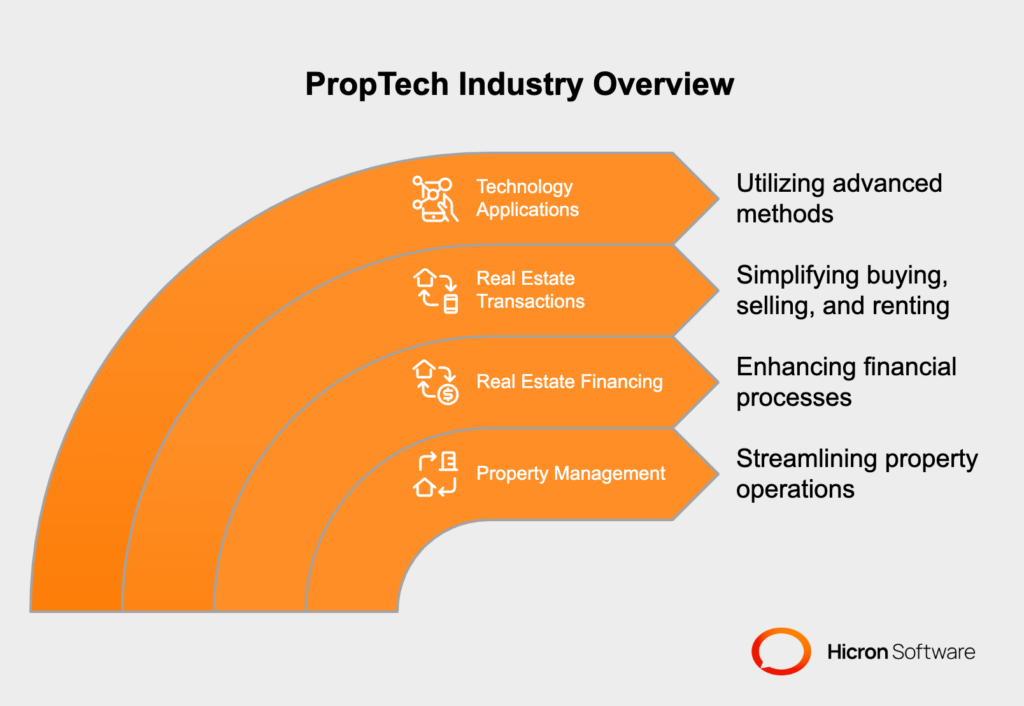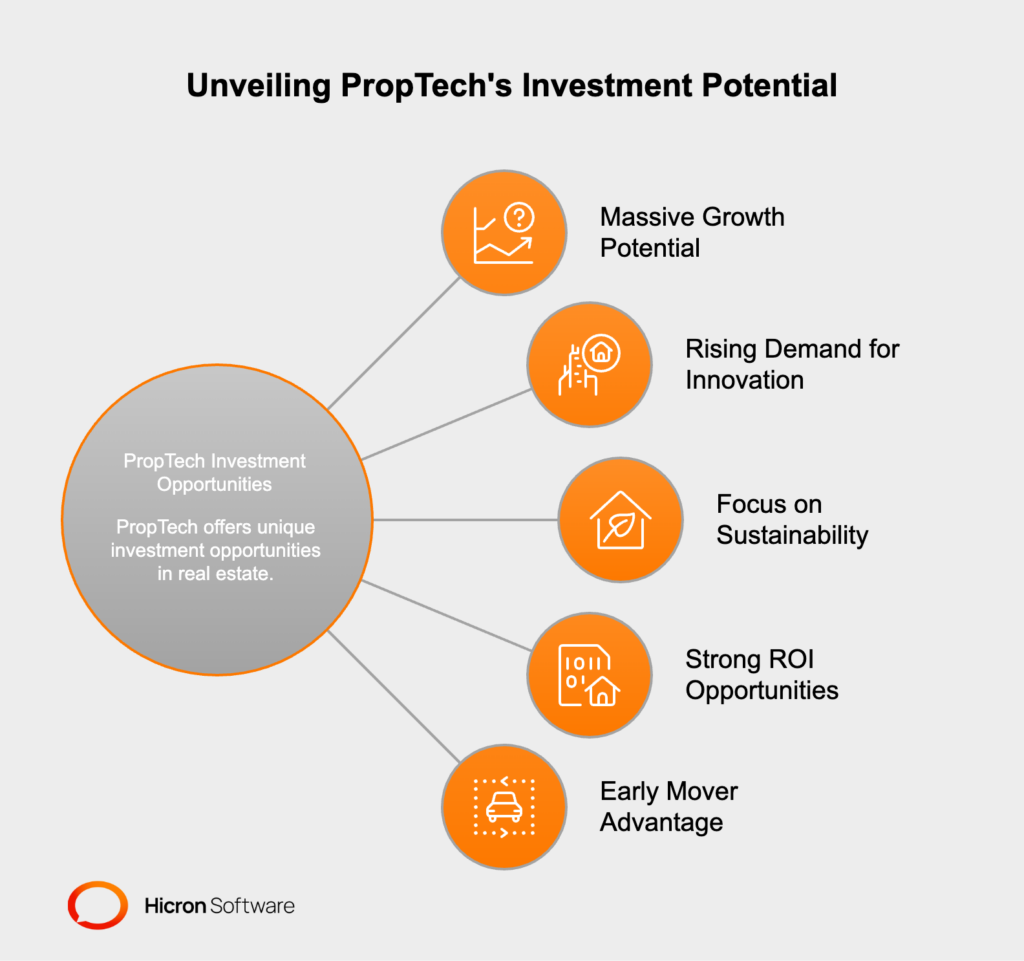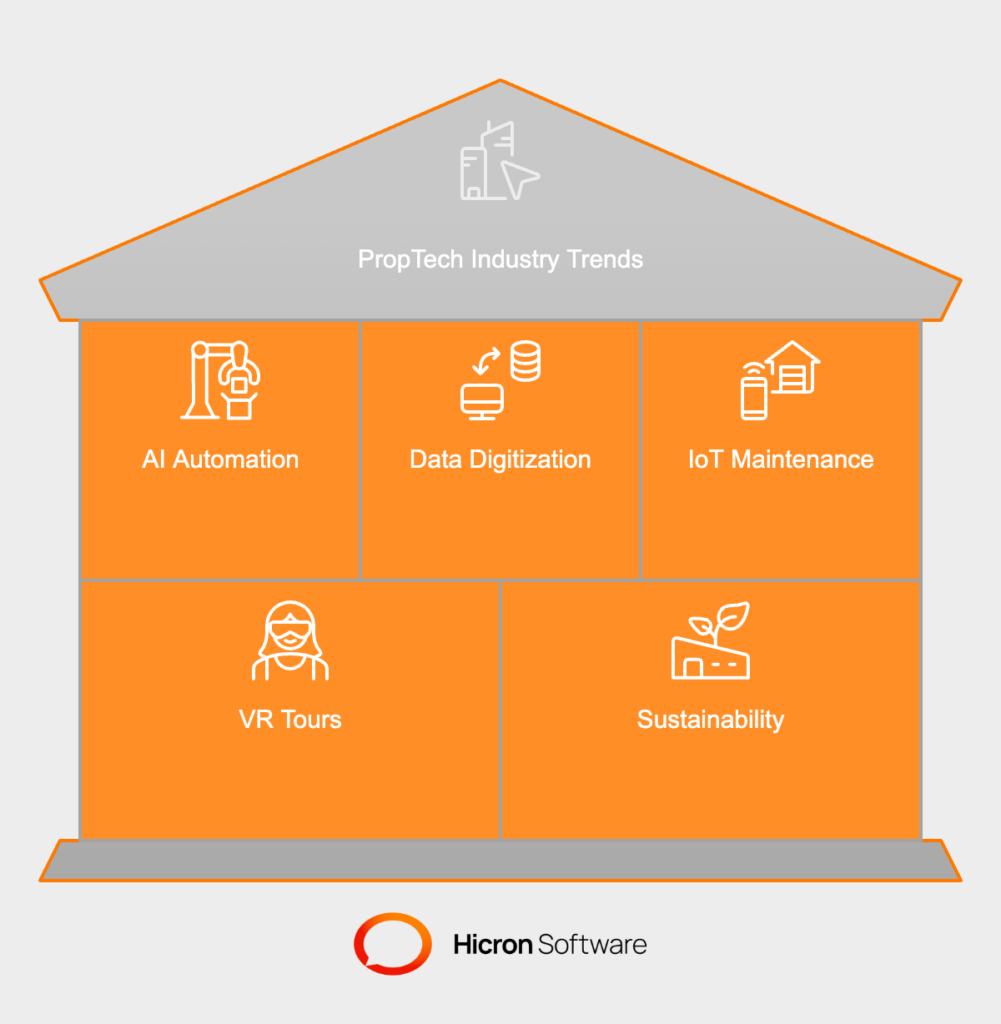Migration to Cloud & Its Benefits
- March 03
- 18 min

The real estate is transforming, primarily driven by the advent of real estate technology, known as “proptech.” The proptech industry holds the potential for entrepreneurs and investors, offering opportunities to address traditional inefficiencies that have affected the real estate industry for years.
The global real estate sector is anticipated to grow annually at 2.77% (CAGR 2024-2029), resulting in a market volume of US$727.80tn by 2029—source: Statista.
Since the real estate market is the world’s largest asset class, proptech ventures have a unique opportunity to deliver major updates in a relatively underdeveloped field.
Key takeaways:
PropTech Industry (Property Technology) stands for using digital technology in the real estate landscape. The proptech industry aims to simplify processes and deliver greater efficiency, sustainability, and user experience. It encompasses aspects such as property and facility management, real estate financing, real estate transactions (i.e., buying, selling, and renting), and more to meet the needs of the real estate industry.

PropTech industry with its technology takes many forms, from applications that create property listings to those for hiring professionals to applications that streamline communication between property owners, tenants, and agents. PropTech solutions often use advanced methods, such as machine learning and automation, to provide these services.
Various sources further classify the PropTech solutions offered in the market. In fact, more than 9,000 PropTech companies are developing solutions to improve different real estate operations, including technology solutions for commercial and residential properties.
The Proptech landscape maps the segments and needs of all real estate professionals, including tools for agents and brokers, real estate solutions for property managers and facility operators, investment and VC solutions, climate technology, digital access management solutions, and more.
PropTech’s importance in the real estate industry is driven by several key factors.
Explore more PropTech companies already shaping the industry.
Integrating PropTech solutions into real estate processes extends beyond automation or efficiency improvements. Despite the numerous benefits offered by proptech solutions, real estate companies can encounter a few challenges when implementing new technologies.
One of the biggest challenges facing the real estate industry is the proliferation of legacy technology systems and software. A real estate company’s core technology infrastructure typically relies on older systems. We know from experience that companies reach for upgrades when software drastically affects operations.
Like many other mature industries, real estate companies still use spreadsheets. They are used for reporting, property valuation, cash flow analysis, budgeting, and forecasting.
Shifting to proptech requires a broader perspective on technology and innovation. Real estate companies will first need to address accumulated technical debt. By enhancing their technological capabilities, they will fully benefit from emerging digital technologies.
Cyber risk will become an even bigger concern and impact financial performance. Legacy software core components are aging, creating security vulnerabilities. Integrating smart technologies in the industry leads to increased cyber security risks.
The global backlash includes the introduction of coding security practices, regular code reviews and penetration testing, the use of strong data encryption protocols, the implementation of authentication and authorization mechanisms, updating systems, and the collaboration of cyber security experts.
The biggest threat in a cyber security strategy is often people. Educating your team about cyber threats and best practices for maintaining security is key.
Regulatory challenges related to sustainability and ESG metrics abound in the real estate sector. Companies may soon be required to disclose ESG data on par with financial data. Many companies in this sector need the data and processes to meet the standards. European companies are generally better prepared than companies in North America and the Asia-Pacific region.
Working with proptech experts can support businesses to maneuver through the complex regulatory environment and ensure compliance with data protection regulations such as RODO and CCPA.
Real estate companies generate vast data daily, but only a tiny percentage have access to real-time analytics. To address this issue, companies can consider adopting updated tech real estate to eliminate data silos.
Real estate companies can improve data sharing between departments and gain valuable insights through analytics by opting for cloud-based software that shares data across functions. An integrated approach would replace separate solutions for transaction management, CRM, and lease management. By breaking down silos, companies can open the potential of their data and make more informed decisions.
Finding the right talent in the technology industry continues to be a challenge. Recent layoffs in the sector may give hope to other industries trying to attract top talent, but demand for such skills continues to outstrip supply.
Real estate and proptech companies are planning to outsource software development. This approach aims to gain new technological capabilities, streamline processes, and increase operations’ flexibility and resilience.
Outsourcing is considered a good option for filling the gap in technology talent and partnering with experienced companies that specialize in software development for real estate and proptech software development.
The PropTech sector is rapidly becoming a game-changer in the real estate industry, offering unprecedented opportunities for investors. With the global real estate market projected to grow significantly over the next decade, the integration of technology into this traditionally slow-moving sector has created a fertile ground for innovation, sustainability, and profitability.

Here’s why savvy investors should take note:
The real estate market is one of the largest asset classes globally, valued at trillions of dollars. PropTech companies are leveraging technology to disrupt outdated processes, creating a significant space for growth. From smart property management platforms to AI-driven analytics tools, the demand for tech-based solutions is accelerating as the industry embraces digital transformation. Backed by this surge, PropTech investments offer the potential for high returns in an expanding market.
Traditional real estate processes like property listing, financing, and management are being revolutionized by digital tools that improve efficiency and user experience. Cutting-edge technologies such as artificial intelligence, IoT, blockchain, and virtual reality are enabling smarter decisions, automating tasks, and enhancing customer satisfaction. These advances not only streamline operations but create entirely new business models, making early investment in such innovations a lucrative opportunity.
Sustainability has become a core priority for real estate stakeholders. PropTech companies are at the forefront of addressing environmental concerns, offering solutions like energy-efficient smart buildings, climate data analysis tools, and green construction technologies. Investors who prioritize ESG (Environmental, Social, and Governance) goals can align their portfolios with sustainability-driven ventures, while also tapping into growing regulatory and consumer demand for eco-friendly solutions.
PropTech combines the stability of the real estate market with the scalability of technology, offering a unique avenue for high ROI. The adoption of PropTech solutions is not limited to one region or demographic but spans globally. Combined with lower barriers to entry compared to traditional real estate investments, PropTech provides a diverse range of lucrative opportunities, from subscription models in property management to B2B SaaS platforms catering to agents and landlords.
The PropTech sector is still in its early stages of transformation, meaning there’s a significant opportunity for investors to position themselves ahead of the curve. By supporting innovative startups or scaling mature PropTech companies, investors can establish a strong foothold in a market poised for long-term growth.
PropTech isn’t just a trend; it’s a shift in the way the real estate industry operates. Investors who recognize the potential of this sector can benefit from its unprecedented blend of innovation, sustainability, and profitability. By aligning investment strategies with this technological revolution, you’re not just placing a bet on real estate’s future—you’re helping shape it.
In the past decade, tech startups have begun to bridge the gap between technology and real estate.

Companies invest in developing artificial intelligence-based technologies, creating new solutions, and adding AI-based modules to existing software. Artificial intelligence and machine learning automate back-office processes, predict searches, and generate personalized emails for customers based on their life events. This trend also includes the use of data with automation. These technologies manage properties and deliver more customized services to customers. The real estate industry is gradually catching up with innovation and technology, implementing new artificial intelligence and machine learning solutions.
Proptech companies and realtors utilize Big Data to collect and analyze real-time and historical data on various real estate assets, providing accurate information on prices, trends, and risks.
The Internet of Things (IoT) is used for predictive maintenance, where devices and sensors constantly monitor property conditions and predict failures. Property owners can conveniently track temperature, security, and maintenance using mobile devices and computers.
Virtual reality (VR) majorly impacts the Proptech industry, as real estate brokers utilize VR technology for virtual property tours and augmented reality solutions.
ClimateTech and GreenTech foster sustainability in real estate. They focus on developing environmentally friendly and energy-efficient buildings. These technologies are revolutionizing the industry and improving the overall experience for professionals and customers alike.
The real estate industry is in the midst of a digital transformation and the implementation of proptech. This technology offers improved data handling, efficiency, and sustainability. Real Estate companies may face challenges related to outdated systems, lack of data interoperability, and technology gaps. In such a situation, working with an experienced software company can help. Developing custom solutions for the real estate industry can help modernize systems, integrate new technologies, and bridge the technical skills gap. It also offers consultation on the matter.
The global PropTech market was valued at $40.19 billion in 2025 and is projected to grow to $88.37 billion by 2032, with a CAGR of 11.9%1. Another estimate places the market at $94.2 billion by 2030, growing at a CAGR of 15.8%.
PropTech integrates technology into real estate processes to improve how properties are developed, marketed, managed, and occupied. It includes tools like virtual tours, predictive analytics, and smart building systems.
The PropTech industry is expected to grow significantly, driven by advancements in AI, IoT, and cloud computing. It is also influenced by increasing demand for efficiency, sustainability, and digital transformation in real estate.
FinTech focuses on financial services like payments and lending, while PropTech applies technology to real estate processes such as property management and transactions. The two intersect in areas like real estate financing.
Investors in PropTech include venture capital firms, real estate companies, and technology-focused funds. For example, SPYRE PROPTECH VENTURE launched a $48.3 million fund to invest in early-stage PropTech companies.
Challenges include navigating complex regulatory landscapes, ensuring data security, and overcoming resistance to technology adoption in traditional real estate sectors.
PropTech can be classified into categories like residential and commercial solutions, software and services, and deployment types (cloud-based or on-premise). It also includes subcategories like property management, asset management, and customer relationship management.
While PropTech focuses on property-specific technologies, RealTech is a broader term that encompasses all technologies used in the real estate industry, including construction and urban planning.
While specific figures for the ESG tech market weren’t found, it is closely tied to PropTech trends like smart buildings and sustainability, which are growing rapidly.
Emerging trends include the use of AI for predictive analytics, virtual and augmented reality for property tours, IoT for smart buildings, and blockchain for secure transactions.
